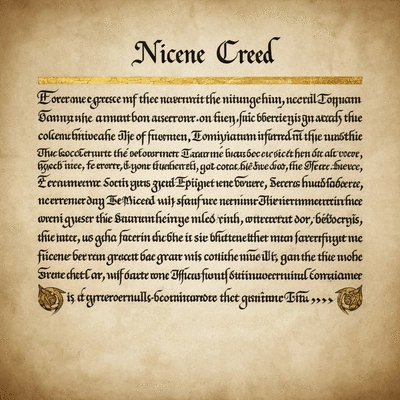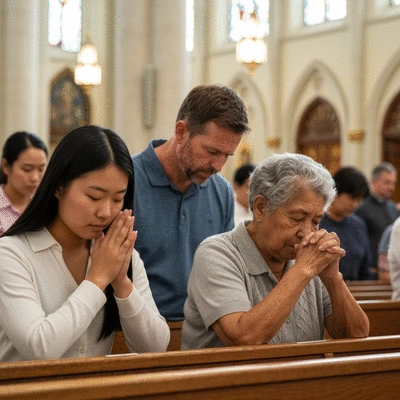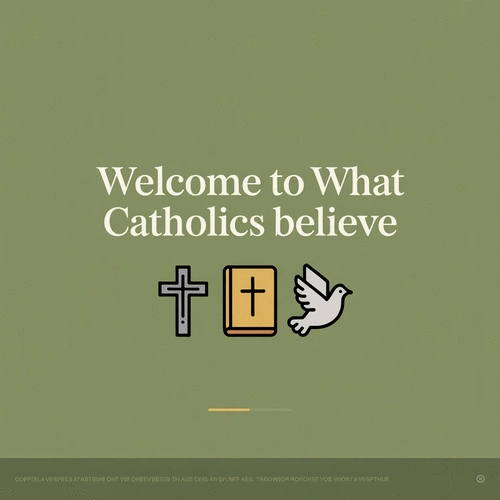As we journey through the historical significance of the Nicene Creed, consider how a document created in a time of turmoil continues to shape our beliefs today. The Creed is more than just a statement of faith; it's a testament to unity and clarity amid conflict.
What You Will Learn
- The Nicene Creed was born from the early Church's need for unified beliefs in response to theological conflicts.
- Key figures like St. Athanasius and Constantine played crucial roles in the Creed's formulation during the Council of Nicaea.
- The doctrine directly countered Arianism, clarifying the nature of Christ as fully divine and fully human.
- Understanding the Creed can enrich personal faith and foster deeper engagement with Catholic teachings.
The Nicene Creed: Origins and Impact
The Nicene Creed represents a pivotal moment in the Catholic Church, born from a need for unity and clarity amidst theological conflict. This visual outlines its key aspects.
Origins & Context:
- Need for unified beliefs
- Theological debates & divisions
- Preservation of core tenets
Key Figures:
- St. Athanasius (Defender)
- Emperor Constantine (Convened)
- 300+ Bishops (Formulated)
Theological Challenge:
- Arianism (Christ as creation)
- Conflict over Christ's divinity
- Need for precise language
Impact & Legacy:
- Unified statement of faith
- Cornerstone of Christian belief
- Guides faith journeys today
Unveiling the Historical Significance of the Nicene Creed
When we explore the Nicene Creed, we uncover a pivotal moment in the history of the Catholic Church. It represents not just a statement of faith, but a response to the profound challenges facing early Christians. The Creed emerged from a desire for unity and clarity during a time of intense theological conflict. Isn’t it fascinating how a document forged in such turmoil still resonates with us today?
As we delve deeper, let's examine the origins of this significant text, its authors, and the historic Council of Nicaea that brought it to life. The journey of the Nicene Creed is as much about the preservation of Christian beliefs as it is about the struggles that defined its creation.
Tracing the Origins: Context Behind the Creation of the Nicene Creed
The early Church was a tapestry of varying beliefs, and many Christians sought to establish a unified understanding of their faith. This period marked a time when clarity in doctrine was crucial. The need for unified beliefs became apparent as divergent teachings threatened the cohesion of the Christian community.
- The rise of numerous theological perspectives stirred debates among believers.
- Confusion regarding the nature of Christ fueled disputes leading to the need for a clear statement of faith.
- Early Christians recognized the importance of a unified doctrine to maintain their identity.
These factors set the stage for the Nicene Creed, reflecting the early Church's commitment to preserving the core tenets of Christianity amidst growing disunity.
The Early Church and the Need for Unified Beliefs
In the early years of Christianity, the Church faced immense challenges, including persecution and internal divisions. Many believers struggled to articulate their faith clearly. As a dedicated Catholic educator, I often reflect on how this struggle mirrors our own quest for understanding today. We all seek connection and clarity in our beliefs, don’t we?
This need for a unified expression of faith led to a call for a council where key leaders could come together to define essential doctrines—thus, the groundwork for the Nicene Creed was laid.
Key Figures in the Development of the Nicene Creed
Several influential figures emerged during this pivotal moment. Most notably, we had St. Athanasius, who played a crucial role in defending the faith against heretical views. His unwavering commitment to orthodoxy inspired many during the debates surrounding the nature of Christ and the Trinity. For further details on the significance of his contributions, you can refer to this insightful article on Athanasius and the development of Nicene theology.
- St. Athanasius: A leading voice championing Nicene orthodoxy.
- Constantine: The Roman Emperor who convened the Council of Nicaea.
- Bishops: Over 300 bishops gathered to discuss and establish the Creed.
These key figures contributed to the formulation of the Creed, ensuring that it would serve as a guiding light for future generations.
The Role of the Council of Nicaea in Formulating the Creed
The Council of Nicaea in 325 AD was a turning point for the Church. It was here that the assembled bishops boldly confronted the emerging heresies, specifically Arianism, which questioned the divinity of Christ. Through careful deliberation, they produced a document that addressed these critical issues, establishing a clear and unified statement of faith. The council's efforts were central to solidifying Christian doctrine, a process further elaborated upon in scholarly works like this article on the historical impact of the Council of Nicaea.
Isn’t it remarkable how the decisions made during this council have lasted through centuries? The Nicene Creed not only shaped the beliefs of the early Church but has also become a cornerstone of our faith today!
Understanding Arianism: The Heresy that Shaped the Creed
To truly appreciate the Nicene Creed, we need to understand the conflict it addressed—Arianism. This heresy, named after Arius, a priest from Alexandria, questioned whether Jesus was truly divine or merely a creation of God. The implications of this teaching were profound, leading to a significant crisis within the Church.

- Arianism posited that Christ was not co-eternal with the Father.
- It sparked significant debate and division among early Christians.
- The controversy prompted a need to clarify Christ’s nature in the Creed.
As we reflect on the Nicene Creed, we can see how it was carefully crafted to counteract such misunderstandings and provide a definitive stance on the nature of God and Christ.
The Conflict between Arianism and Nicene Orthodoxy
The theological battle against Arianism was not just a struggle for power but a matter of faith. Nicene orthodoxy emphasized that Jesus is both fully God and fully man—a mystery central to our beliefs. How can we not marvel at the depth of this doctrine?
This conflict forced the Church to articulate its belief more clearly, leading to further developments in Christian theology and shaping how we understand the nature of God today.
How Heretical Views Influenced the Final Text of the Creed
The debates surrounding Arianism directly influenced the language of the Nicene Creed. Phrases like "true God from true God" were carefully chosen to affirm Christ’s divine nature against the backdrop of heretical views. This precision in wording provided a strong defense for the Church’s teachings and was essential for its acceptance across the Christian community.
It’s fascinating to see how these theological disputes helped formulate a document that will guide us for generations to come!
Athanasius and His Defense Against Arianism
Athanasius was a stalwart defender of the faith, earning him the title "the Father of Orthodoxy." His passionate arguments and writings played a significant role in countering Arianism. I often reflect on how his fervor can inspire us to stand firm in our beliefs today. Have you ever felt called to defend your faith? His unwavering commitment to orthodox teachings is further explored in studies on the historical impact of Athanasius on Christian thought.
Through his efforts, Athanasius helped to solidify the Nicene Creed as an essential declaration of our beliefs, ensuring that future generations would have a clear understanding of Christ’s divinity.
Interactive Poll: Your Thoughts on the Nicene Creed
As we've explored the historical significance and impact of the Nicene Creed, we want to hear your perspective! How do you feel about the role of the Nicene Creed in today’s Catholic faith?
Impact of the Nicene Creed on Personal Faith Journeys
The Nicene Creed serves as a guiding light for many Catholics, shaping their personal faith journeys in profound ways. By embracing this ancient statement of faith, we can navigate the complexities of belief in our daily lives. Have you ever considered how a simple affirmation can deepen your understanding of God and your relationship with the Church? Let's explore some heartfelt testimonials that illustrate the transformative power of the Creed.
Real-life Testimonials: Transformative Experiences with the Nicene Creed
Many individuals have shared their experiences regarding the impact of the Nicene Creed on their faith. Here are a few inspiring stories:
- A parishioner reflecting on how reciting the Creed during Mass fosters a sense of belonging in the community.
- A young adult describing how studying the Creed has clarified their understanding of the Trinity and the importance of God’s presence in their life.
- An individual expressing how embracing the Creed has led to a deeper commitment to living out the teachings of Christ.
These testimonials showcase the power of the Nicene Creed as a tool for personal reflection and growth. It invites us to delve into the core beliefs of our faith, encouraging us to deepen our relationship with God.
How Understanding the Creed Deepens Faith
When we take the time to understand the Nicene Creed, we unlock a wealth of knowledge about our faith. It’s more than just a set of words recited on Sundays; it's a profound statement that encapsulates the essence of Catholic doctrine. Through its teachings, we gain insights into the nature of God, the role of Jesus Christ, and the significance of the Holy Spirit.

As we ponder these elements, we may find ourselves more engaged in our spiritual lives. Reflecting on the Creed allows us to ask important questions, leading to a richer understanding of our beliefs. Have you ever found that your understanding of a particular phrase in the Creed has inspired a shift in your perspective?
Personal Reflections on Living the Creed in Everyday Life
Integrating the Nicene Creed into our daily lives can be both a challenge and a rewarding experience. Here are practical ways to live out the Creed:
- Seeking opportunities to discuss the Creed with family and friends, fostering a deeper understanding.
- Participating in community prayer sessions or study groups centered around the Creed.
- Applying the teachings of the Creed in everyday interactions, especially in challenging situations.
By actively living the teachings found within the Nicene Creed, we affirm our beliefs and demonstrate how faith can guide our actions. Each of these practices reinforces our commitment to faith and unity in the Church community!
Exploring the Concept of Salvation through the Nicene Creed
One of the most profound aspects of the Nicene Creed is its articulation of salvation. The Creed reminds us that salvation is not just a distant promise; it is an ongoing journey. Recognizing Jesus as the Savior opens our hearts to the notion that we are all invited to participate in God's redemptive plan.
In reflecting on this concept, we may find ourselves asking: How does the understanding of salvation influence our day-to-day choices? It encourages us to live with purpose, compassion, and a desire to share God's love, aligning our lives with the teachings of the Creed.
Engaging with the Nicene Creed: Resources and Further Learning
To further enrich our understanding of the Nicene Creed, a plethora of resources are available. These tools can help illuminate the complexities of Catholic doctrine, making it approachable and engaging. Let's take a look at some of the multimedia options that can enhance our learning experience!
Frequently Asked Questions about the Nicene Creed
- Q: What is the primary purpose of the Nicene Creed?
- A: The Nicene Creed was formulated to establish unified beliefs within the early Church, clarify core doctrines, and specifically counter heretical views such as Arianism regarding the nature of Christ.
- Q: Who were the key figures involved in the creation of the Nicene Creed?
- A: Key figures included St. Athanasius, who passionately defended orthodox beliefs, and Emperor Constantine, who convened the Council of Nicaea, where over 300 bishops collaborated on the Creed's formulation.
- Q: What was Arianism, and how did the Nicene Creed address it?
- A: Arianism was a heresy that questioned Christ's divinity, asserting he was a creation of God rather than co-eternal. The Nicene Creed directly countered this by affirming Jesus as "true God from true God," emphasizing his full divine nature.
- Q: How does the Nicene Creed impact personal faith today?
- A: Understanding the Nicene Creed can deepen personal faith by clarifying core Catholic teachings, fostering a sense of belonging in the community, and inspiring a commitment to live out Christian principles in daily life.
- Q: Where can I find resources to learn more about the Nicene Creed?
- A: Resources include multimedia tools like videos, infographics, and podcasts, as well as community discussions, study groups, and the Catechism of the Catholic Church, which provides detailed explanations of its components.
Multimedia Tools for Understanding the Nicene Creed
In today’s digital age, there are numerous multimedia tools that simplify complex theological ideas. Here are some recommendations:
- Videos that break down the Nicene Creed line by line, explaining each phrase's significance.
- Infographics that visually represent the relationships within the Trinity and how the Creed encapsulates these beliefs.
- Podcasts featuring theologians discussing the historical context and implications of the Creed.
Utilizing these resources can foster a deeper engagement with the Nicene Creed. Each medium offers unique insights, enriching our understanding and appreciation of our faith.
Getting Involved: Community Discussions and Study Groups
Participating in community discussions and study groups is an excellent way to engage with the Nicene Creed on a deeper level. Here are some ways to get involved:
- Join local faith communities that host discussions around the Creed and its implications for modern life.
- Participate in Bible studies focusing on key components of the Creed, enhancing your understanding through group dialogue.
- Explore opportunities to lead or facilitate discussions, sharing your insights while learning from others.
Each of these activities can help build connections with fellow Catholics and create an environment of shared learning and growth. I'm always inspired to see how our community comes together to support one another in our faith journeys!
Utilizing the Catechism of the Catholic Church for Study
The Catechism of the Catholic Church is an invaluable resource when studying the Nicene Creed. It provides a comprehensive exploration of various aspects of our faith, including detailed explanations of the Creed's components. By examining the Catechism alongside the Creed, we can better understand how our beliefs shape our actions and lives.
Have you thought about how the Catechism can serve as a guide on your spiritual journey? Engaging with it can deepen your appreciation for the richness of Catholic doctrine and help you navigate your personal faith journey more effectively.
Recap of Key Points
Here is a quick recap of the important points discussed in the article:
- The Nicene Creed emerged as a unifying statement of faith during theological conflicts in the early Church.
- Key figures, including St. Athanasius and Emperor Constantine, played critical roles in its development during the Council of Nicaea.
- The Creed was formulated to counteract heretical views like Arianism, emphasizing the divine nature of Christ.
- Understanding the Nicene Creed can deepen personal faith and encourage community discussions around its significance.
- Engaging with multimedia resources and community study groups enhances comprehension and appreciation of the Creed's teachings.









